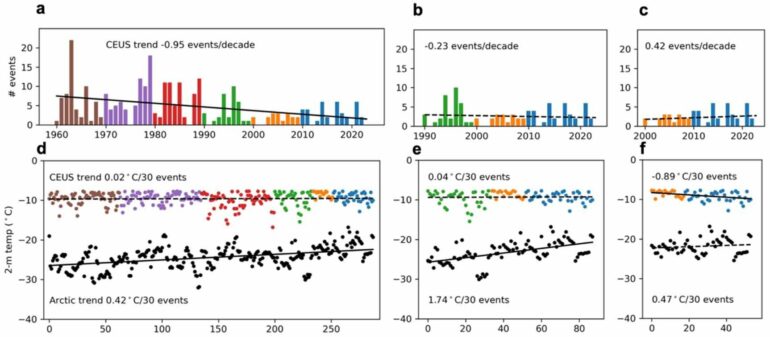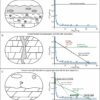A team of scientists, led by a climate expert from the University of Lincoln, U.K., says that continued rapid warming in the Arctic may be linked to severe cold-air outbreaks in the U.K. and nearby parts of Europe as well as North America and Asia.
The study, published in Environmental Research: Climate, finds that, paradoxically, despite abnormal warmth globally and especially in the Arctic, these outbreaks may continue and perhaps become more frequent across the Northern Hemisphere. The research suggests that the apparent paradox is in part caused by the Arctic region warming several times faster than the globe as a whole, termed “Arctic amplification.”
The stratospheric polar vortex is a mass of cold whirling air that forms high above the Arctic surface in response to the large north/south temperature difference that develops during winter. However, a weaker vortex, which happens periodically and may have become more common in recent years, can influence the jet stream that flows lower in the atmosphere and farther south. A disrupted jet stream can generate certain conditions called “blocking” that can lead to pockets of cold Arctic air plunging much farther south than usual.
In this review, the team evaluated recent research to better understand these complicated interactions. Their findings could benefit seasonal prediction and extreme weather preparedness, as well as provide a greater understanding of climate change.
Edward Hanna, Professor of Climate Science and Meteorology at the University of Lincoln, explained, “Despite strong ongoing global warming, Northern Hemisphere midlatitude regions in Eurasia and North America have continued to experience some surprisingly severe cold-air outbreaks in winter in the last 10–20 years, which have continued to cause major social and economic disruptions and may seem surprising, as surely cold extremes should be becoming much rarer with human-driven climate change.
“In this comprehensive review of recent literature augmented with new analysis, we find the ongoing warming of the Arctic may provide an explanation. The Arctic may seem irrelevant and far away to most folks, but our findings say the profound changes there could be affecting billions of people around the Northern Hemisphere.
“To reverse these trends, it will take bold and rapid actions to reduce our burning of fossil fuels and the build-up of heat-trapping gases in the atmosphere, but the tools exist if we can muster the will.
“We make recommendations for further research, especially into interactions between the troposphere (the lowest layer of the atmosphere, which extends up to about 10 kilometers), and the stratosphere directly above it, using recently developed theoretical concepts and next-generation climate models that can help to unravel different possible causes of cold air outbreaks under climate change and also explain the changes in the atmosphere that drive these extreme weather events.”
Dr. Jennifer Francis, Senior Scientist at Woodwell Climate Research Center (Massachusetts, U.S.) and co-author, commented, “Even though the globe is warming, and cold records are falling less often, we are still seeing surprisingly severe cold spells that sometimes last for many days and invade regions unaccustomed to severe cold.
“It seems really counterintuitive, but there will be plenty of ice, snow, and frigid air in the Arctic winter for decades to come, and that cold can be displaced southward into heavily populated regions by Arctic heat waves.”
The study was the result of an international workshop which was held in 2023 in Lincoln and was supported by the University of Lincoln, the International Arctic Science Committee, and the World Climate Research Program’s Climate & Cryosphere project.
More information:
Edward Hanna et al, Influence of high-latitude blocking and the northern stratospheric polar vortex on cold-air outbreaks under Arctic amplification of global warming, Environmental Research: Climate (2024). DOI: 10.1088/2752-5295/ad93f3
Provided by
University of Lincoln
Citation:
Study finds Arctic warming tied to severe cold spells in UK, Europe (2024, December 11)



